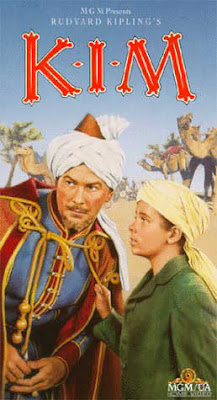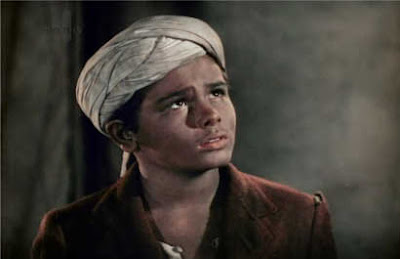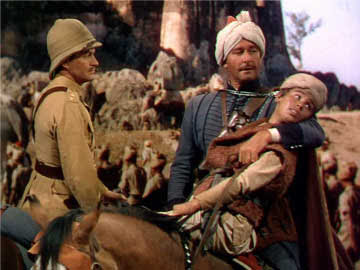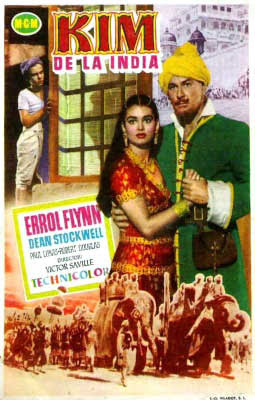Kim

Director: Victor Saville
Year: 1950
Rating: 7.0
A few months back I read Searching for Kim by
Peter Hopkirk. Initially, my intention had been just to read Hopkirk’s book.
He is a well-known essayist, historian and traveler and wrote The Great Game
about the rivalry between Russia and Great Britain over the Indian sub-continent.
But not surprisingly, considering the title of his book, it soon occurred
to me that reading his book without having ever read Kim made no sense. So,
I was able to pick up a copy of Kim at a local bookstore and immersed myself
in the book expecting the worst but loving it almost immediately.

It is a wonderfully descriptive narrative
about India during Kipling’s time. Now Kipling is persona non-grata for proudly
being a part of the British Raj, but really what does one expect? He was
a product of his time and his upbringing. He was born in Bombay in 1865 to
parents who lived there, his father was a professor and his mother a socialite.
He went back to England for school but returned to India in 1882 to work
on a newspaper in Lahore. He soon began writing short stories about life
in The British Raj and though he left India in 1889 never to return he continued
to write about India all his life. It clearly enthralled him and wove its
spirit into him and his knowledge of the Indian people, the Brits living
there and the land is enormous. This love of India is readily apparent in
Kim, as the young orphan boy of Irish ancestry left to live alone on the
streets of Lahore is slowly drawn into the Great Game on the side of the
British and travels throughout India either with his holy man or on his own.
The Hopkirk book is a perfect companion as the author follows in Kim’s footsteps
and informs the reader of what these places are like today, throws in historical
context and identifies the real people in Kipling’s life that the characters
were modeled after. Apparently, an Indian author wrote a sequel to Kim in
which Kim deserts the British Raj to fight for Indian independence and dies
at the massacre at Amritsar. No thanks.

And now I finally got around to the 1950
film with Errol Flynn as Mahbub Ali, Paul Lukas as the Holy Man and Dean
Stockwell as Kim. It is a terrific Technicolor adventure for the whole family.
A good chunk of it was filmed in India and parts in California but trying
to figure out which is which is not easy. The parts that are clearly India
such as the British school at Lucknow are stunning. Apparently, all the scenes
with Flynn in them were shot in California with Indian backdrops behind him.
Maybe they didn't trust Flynn to stay sober in India.

It follows the book reasonably closely with
Kim becoming the chela to the Buddhist Holy Man who is searching for a river
that was created when Buddha shot an arrow into the sky and where it landed
a river sprung up. Their journey takes them on the Grand Trunk Road that
cuts across much of India and the streams of people of all types and religions
is fascinating. Kim is a friend to Red Beard aka Mahbub Ali who is a secret
agent for the British and he brings Kim into the Great Game by using him
to deliver messages and sending him to spy school. The Russians, bastards
that they are, have paid off various tribes in Afghanistan to invade India.
We are of course expected to root for the Brits. When this film was made,
Britain had lost India three years earlier in 1947 much to the chagrin of
Churchill. But Raj films had been popular for decades in Hollywood and would
continue to be for a few decades more - but it becomes a little harder as
time passes to root for the Imperialists - till the bugles and the bagpipes
blow and then you can't help it. It is MGM quality but definitely made with
children in mind and so keeps it safe and mainly bloodless.






